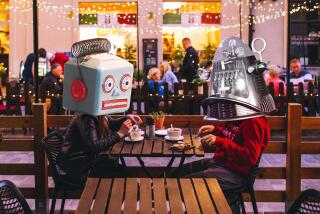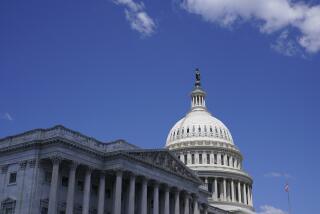Fred got fed again, but the numbers are out there--advancing, ever multiplying. . . . Count on it
- Share via
My old friend and colleague Charles Chappell, once city editor of the long-departed down town Daily News, was dismayed the other evening by what he considers a sign that before long we will all have numbers, instead of names.
Chappell was waiting to be seated in a Pasadena restaurant when the young woman at the reservations desk asked a patron for his name. The man told her it was Fred.
“All right, Fred,” she said, “I’ll let you know when a table is available.”
What troubled Chappell about this incident was the possibility that more than one Fred might be waiting for a table.
“What if we have two or three Freds fighting over which one was meant when she called?”
Chappell reasons that the only solution, as we become more numerous, is to assign each person a number, as we now assign personalized license plate numbers.
“Thus a man would walk in a restaurant and identify himself as Fred 42,133. Or a woman might be Debbie 26,546. On reaching Jack 1,000,000, it might be desirable to avoid confusion by starting over with Jack 1A, and so on. That would give 26 million combinations.
“By that time the use of last names might come back. And parents could avoid cumbersome numbers for their children by giving them unusual names like Hezekiah, Ebenezer, Hepzibah, Sophronia and so forth. . . . “
To some extent, what Chappell fears is already here. Since 13 million of us were given serial numbers in World War II, the identification of citizens by numbers has been a growing phenomenon.
Each of us, to begin with, has a Social Security number. Each has a telephone number and a license plate number that is different from anyone else’s. Most of us have long numbers by which we are known by the magazines we subscribe to and by the mail order houses we do business with. My wife is known to Sunset magazine, for example, as 300004 SIT 4251RO95 4444 K166219087 D36.
But the trend is toward numbers, rather than letters. Note what the telephone company has done to those easily remembered old neighborhood prefixes (OXford, CApitol, CRestview), on the implausible theory that numbers are easier to remember.
As we progress toward a numbered population, I doubt that any Fred will be able to retain his personal identity in a number-name. He will not be Fred, 42,133. He will be 565-42-133, which will serve not only as his Social Security number but also his phone number and his automobile license plate number, as well as the number for every other kind of identity he has.
This idea was proposed some years ago in Yolo Volante, an esoteric quarterly published by the Zamorano Club of Los Angeles.
“I believe,” the author wrote, “that it would be quite possible to assign a combination of numbers to each individual as he is born. This same number would be in lieu of a name and could stay with him throughout the rest of his life and even unto death. This number could take the place of all other numbers. . . . “
The article is signed 213-4789711-246-0-1703301-90024 (formerly W.E.G.).
(If that number happens by chance to belong to anyone else, I regret the coincidence.)
The futurist Isaac Asimov notes in “The Roving Mind” that the trend toward numbers can only increase: “The thought may be revolting to us today, but it is irresistible. As the complexity of our society increases, the quantity of our number-designations increases. There are now area codes, ZIP codes, and Social Security numbers, all of them unknown 60 years ago, and all absolutely necessary now if the telephone network, the post office and the tax system are to work.”
The numeration of persons may seem a threat to our individuality and our democracy, but Asimov holds that, on the contrary, it will make us freer. He holds that since the government will know who we are, it will fear us less, and the less fear at the top, the more freedom below.
“It is precisely because the society is computerized that he (the individual) can be made to feel so individual because he is so well targeted. It is in the non-computerized society that his wants and needs are unknown to anyone but himself and his immediate associates and he becomes a faceless nothing.”
I don’t know. I think I’d rather be known just as Occupant.
Asimov foresees a day when we will all get our mail and our news by computer, and each of us will have his own personal television channel, over which he will receive all the messages, catalogue material and advertisements directed to his number.
Will there be no escape?
I like Chappell’s idea of giving children unusual names (though not necessarily biblical), so that it will be easier for them to retain their identity.
Some time ago a former employee of the Bank of America sent me a list of names in which accounts were actually opened over a period of years in the Beverly Hills office.
The list includes bizarre last names as well as given names, but it shows what can be accomplished with a little imagination.
How do you like these? Vera Klopp Dodder, Audregay Zook, Barbel Klincherfuss, Moses Boozer, Tingley Thorogood, Kaspel Twid, Bittersweet Wojtlya, Prior Love Thurston, Yaffa Z. Flitterman, Olive Orchard and Litzy Tritsch.
Are they not unique? Do they not ring with individuality? Each one as different as a fingerprint?
I had no such luck. With my name, I’d be better off with a number.
Call me Jack 1A.
More to Read
Sign up for Essential California
The most important California stories and recommendations in your inbox every morning.
You may occasionally receive promotional content from the Los Angeles Times.













